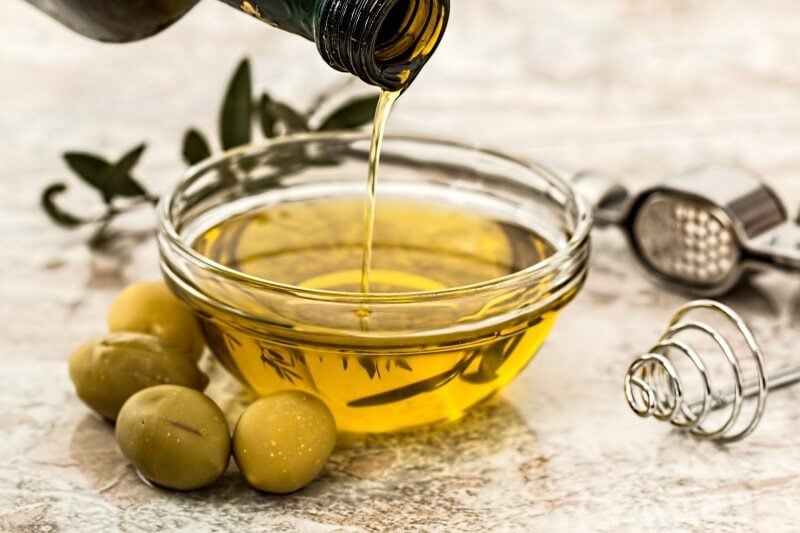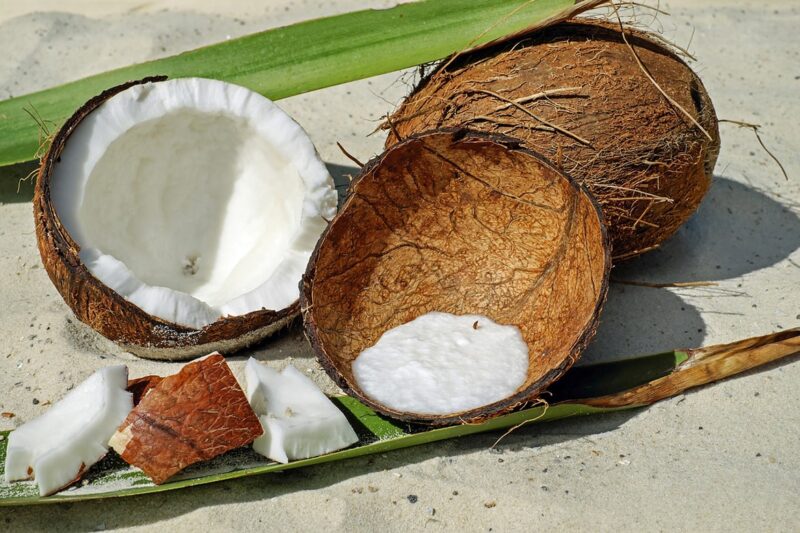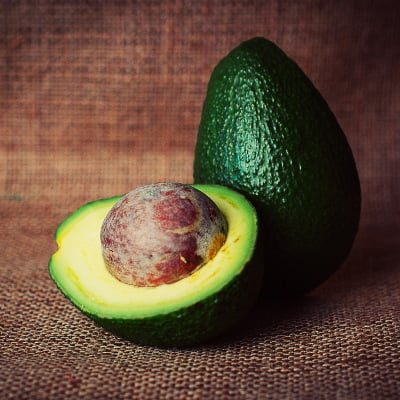The 10 Italian food commandments:
1. You shall not put ketchup on pasta.
2. You shall not eat pasta or rice as a side dish.
3. You shall not eat fruit without peeling it first.
4. You shall not drink anything bar water and wine during meals.
5. You shall not eat meatballs with spaghetti.
6. You shall not cut spaghetti.
7. You shall not put pasta in a sandwich.
8. You shall not overcook pasta.
9. You shall not put cheddar cheese or parmesan on pizza.
10. You shall not cook with any oil bar extra virgin olive oil.
(Why are they almost all about pasta? Mmmmm…)
I never thought I’d ever break these commandments.
I mean, they’re just common sense. Vegetable oil may be cheap but why would you ruin good food like that when olive oil makes it taste oh so much better (and is healthier for you)?
Had you asked me, I thought I wouldn’t use the damned thing even if you paid me £1.000.000. Italians are that serious about their food.
Turns out, I was eating plenty of it. Because this Italian girl may know a thing or two about how food should be prepared and cooked but is way too lazy to do it (ahem).
Since moving to London, my mom’s delicious home-cooked meals have been replaced by ready-made dishes that are super quick to make (but not particularly nutritious).
Problem is, they’re full of vegetable oils. And vegetable oils don’t do your skin any favours. Worse, they make you age faster.
The Problem With Vegetable Oils
Vegetable oils are a broad term. Here, I’m using it to mean polyunsaturated vegetable oils, such as:
- Canola oil
- Corn oil
- Safflower oil
- Soy oil
- Sunflower oil
- Other seed oils
These oils are bad for your skin because they have a bad omega-6/-3 ration.
Omega-3 are the good kind of fat. They are anti-inflammatory, so they can soothe irritations and prevent sun damage. Plus, they boost the production of collagen, the protein that keeps your skin firm.
Omega-6 are a double-edged swords. While they’r not bad for your health and skin, omega-6 are the precursors for prostaglandins, leukotrienes and other molecules that promote inflammation. They also oxidize easily and can cause premature aging.
Now, don’t fret. Omega-6 aren’t all bad for you. In fact, your body and your skin need both omega-3 and omega-6 to stay healthy and strong.
But, their amount matters. A lot. The ideal omega-6/-3 ratio is between 1:1 and 3:1. But, on our Western diet, the ratio we end up consuming is more like 15:1!
If you’re wondering how to restore this balance, getting rid of the vegetable oils above is a good place to start. As I’ve mentioned, they have a very poor omega-6/-3 ratio.
Plus, they’re highly refined. Again, I don’t want to demonize food. But, as a rule, the less modified a food is, the better it is for you.
Mind you, that doesn’t mean you can never buy a ready-meal or eat out ever again. Yes, most supermarkets and restaurants use these vegetable oils because they’re dirty cheap. Once in a while, they won’t do you much harm.
But, if you can, cooking your own food with healthier oils at home is a much healthier option. It doesn’t even take that much time. Oil the pan, put food in it and cook it for 5 minutes or so. Done. Tastier and healthier.
Struggling to put together a skincare routine that minimises wrinkles, prevents premature aging, and gives your complexion a youthful glow? Download your FREE “Best Anti-Aging Skincare Routine” to get started (it features product recommendations + right application order):
Which Are The Best Cooking Oils For Younger-Looking Skin?
Oils high in MUFAs (monounsaturated fatty acids). These fats, which include oleic acid and palmitoleic acid, are super moisturizing and can fight oxidative stress (one of the main causes of premature aging), too.
So, where do you find them?

Extra Virgin Olive Oil
Told ya! When it comes to food, Italians do it better (I know, I’m biased). For centuries, we’d been drizzling this stuff on salads, meat, fish, bread and anything edible. Its slightly fruity, peppery taste adds plenty of flavour to your meal. But, these days, I use it mostly on cold dishes.
Olive oil is good for you because:
- It’s high in oleic acid, a monounsaturaed omega-9 fatty acid that reduces oxidative stress damage (read: prevents and treats wrinkles)
- Its high MUFAs content lowers the risk of UV-induced damage (read: prevents premature aging)
- It has antioxidant properties that fight free radicals
- It has anti-inflammatory properties that soothe irritations
Bruschetta, anyone?
Related: Everything You Need To Know About Olive Oil In Skincare
Macadamia Nut Oil
Man, this was a pain to find! I scoured every supermarket in my neighbourhood in vain. I eventually found a bottle at Whole Foods. It’s pretty small and cost me more than £6. Eating healthy is expensive.
I’m not complaining, btw. I can’t afford to buy all my groceries at Whole Foods or go down the complete organic route just yet, but every little bit helps.
Any money that I spend on healthy foods now will be money saved in health care bills later on. If that means that £20 will get me a bottle of macadamia oil, a few grammes of grass-fed beef and some free range eggs rather than two H&M dresses, so be it.
I understand that no one can overhaul their diet completely right now (I can’t either) so do what you can when you can. If you can only afford one of the good oils in this post, buy that one and use it all the time in place of vegetable oils. You’ll be a little bit healthier and your skin a little bit younger.
Macadamia nut oil is good for you because it’s full of MUFAs:
- It has anti-inflammatory properties that calm down irritations
- It reduces oxidative stress (one of the main causes of premature aging)
- It has a high smoke point (read: it stays stable at high temperatures, so it doesn’t create unhealthy compounds when you cook with it)
This is the priciest of the oils I have, so I use it sparingly. When I do, it’s always a treat. Its nutty flavour is delicate but tasty.

Coconut Oil
This is a bit different from the other oils because it’s rich in MCFAs (medium-chain fatty acids). They include lauric acid, caprylic acid and capric acid. They’re what makes coconut oil so good for you:
- It has anti-inflammatory properties that soothe irritations
- It raises the levels of good cholesterol and prevents metabolic diseases (like cancer)
- It’s easily digested so it provides instant energy
I use this one quite a bit, too. Not as much as olive oil, but it’s a close second.
Related: Everything You Need To Know About Coconut Oil In Skincare

Avocado Oil
I haven’t bought this one, yet. I don’t feel the need to because I eat avocados like candy. They’re so yummy!
Like macadamia nut oil, avocado oil is high is MUFAs too and has a high smoking point, so it’s great for cooking. It does pretty much the same thing so I won’t repeat it all here. But, if you’re allergic to nuts, this is a great alternative.
The Bottom Line
Want younger-looking skin? Ditch vegetable oils and load up your food with oils rich in MUFAs and MCFAs. When it doubt, do it Italian style. You can never go wrong with a bit of extra virgin olive oil.


You should not eat fruit without peeling it first? What´s the Italian reasoning behind it??
And thanks for the ratio!!! Good to know.
Barbara, the peel is the part most exposed to pesticides, germs and impurities. It’s safer not to eat it. That’s what I’ve always been told anyway.
Yea that makes sense. That´s what I heard too, but wanted to check if there was an even older Italian explanation hehe. Thanks!
Not that I know. I guess it’s just something we naturally do. 🙂
Hello Gio. I’m newcomer of your blog. Thank you for your articles, they are very useful! 🙂
I have a question. I heard that olive oil is quite questionable, while it is good to use it for cold dishes, as you mentioned, such as salads, it is not doing great when you heated it and perhaps it might be even dangerous than a regular sunflower oil. What do you think about this statement?
Elena, olive oil is a tricky one because there are many types and not all of them pure. Extra virgin olive oil has a smoke point lower than some refined oils but that doesn’t mean you should go with the latter. Olive oil still has a good ratio of omega 6 and 3 so I’d go with that. Having said that, you can always go with other oils, such as avocado oil, for cooking.
Lovely.
I’m using olive oil and coconut oil from last couple of years, but never tried avocado oil and macadamia nut oil. But i think i should give them a try.
Thanks.
Jyoti, they’re great oils for cooking. Macamadia has a delicate nutty flavour that I really love.
Hi,
Thank you for the lovely information.
Which of the oils that you have mentioned is the best for people suffering from acne??
Kirti, I’d go with macadamia nut oil.